
Gratitude: How to Make It a Daily Habit for Joyful Living:
Set in the whirlwind of day-to-day life the small blessings we’re surrounded with every day may be easily forgotten. But one of the easiest yet most effective strategies to improve your overall well-being is by developing gratitude. There is abundant research that shows that practicing gratitude leads to happier, less stressed, and even physically healthier lives. But how do you make gratitude a habit, when the world so often trains us on what we don’t have?
In this article, we’ll explore the transformative power of gratitude and provide actionable steps to integrate it into your daily routine for a more joyful and fulfilling life.

What Is Gratitude and Why Does It Matter?
Saying thank you is not the only expression of gratitude. It involves having a profound appreciation for the people events and possessions that make your life worthwhile. Recognizing these blessings causes your brain to release the feel-good chemicals serotonin and dopamine which lower stress and increase happiness.
Research suggests that gratitude can:
- Strengthen relationships
- Improve mental and emotional health
- Enhance sleep quality
- Boost self-esteem
- Encourage resilience during difficult times
Being grateful helps you concentrate on what’s right rather than what’s wrong which makes it easier to find joy even in trying times.
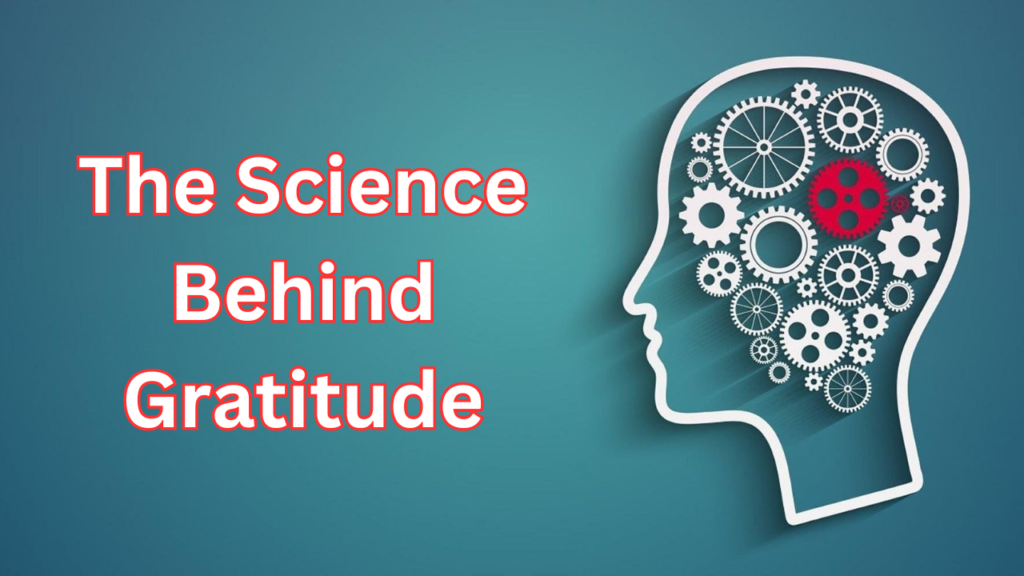
The Science Behind Gratitude:
Gaining knowledge of the science behind gratitude can help make its advantages more apparent. According to a study in Frontiers in Psychology people who practiced gratitude saw improvements in their mood and mental health that lasted for a long time. A positive outlook on life is reinforced by gratitude which activates brain regions linked to reward morality and interconnectedness.
Furthermore, gratitude has a ripple effect. When you express thankfulness, it encourages others to do the same, fostering a culture of positivity in your social circles.
Although it is frequently dismissed as a mere expression of gratitude gratitude has strong scientific foundations that impact mental emotional and physical health. Fundamentally gratitude is an appreciation of lifes good things which strengthens bonds between people and their surroundings. Gratitude activates brain areas linked to reward and social bonding including the ventral striatum and medial prefrontal cortex according to psychology and neuroscience research. Feel-good neurotransmitters like serotonin and dopamine are released in these areas improving mood and fostering long-term happiness. Moreover cultivating gratitude can lessen anxiety and promote emotional resilience by lowering cortisol levels the body’s main stress hormone.
Gratitude affects physical health as well. Research indicates that people who express gratitude regularly have better heart health lower blood pressure and better sleep. This may be the case because being grateful promotes healthful habits like exercising eating better and following medical advice. Gratitude fosters empathy and mutual appreciation which are essential for preserving connection and trust in social interactions. Writing about what one is grateful for in a gratitude journal has become more and more popular because it has been shown to gradually rewire the brain to be more positive.
Essentially being grateful is a transformative practice supported by science rather than a transient emotion. People can cultivate stronger relationships improve their general quality of life and cultivate an optimistic outlook that finds the positive in even the most difficult situations by adopting an attitude of thankfulness.
Barriers to Gratitude:
Even though it has many advantages many people find it difficult to regularly practice thankfulness. The following are typical obstacles:
- Negativity bias: Our brains are wired to focus on threats and problems rather than positive experiences.
- Busy lifestyles: In a modern 21st-century world, it’s easy to overlook moments of joy.
- Comparison culture: Feelings of inadequacy are frequently exacerbated by social media making it more difficult to appreciate what you have.
Overcoming these barriers requires intentionality and practice.

How to Cultivate Gratitude Daily:
A powerful technique that can change your perspective and improve your general well-being is practicing gratitude every day. First start a gratitude diary in which you list three things for which you are grateful every day. This easy exercise aids in changing attention from problems to life’s good things. Adding mindfulness is another powerful strategy to cultivate gratitude pausing to appreciate small commonplace things such as a warm cup of coffee or a supportive remark from a coworker can increase your sense of gratitude. Thanking people whether via a sincere message text or just a thank you improves relationships and spreads happiness. Furthermore before going to bed repeating affirmations or thinking back on pleasant experiences can support an attitude of gratitude. Integrating these practices into your daily routine fosters a persistent attitude of thankfulness that improves happiness lowers stress levels and fortifies emotional fortitude.
Creating a gratitude habit doesn’t have to be time-consuming or complicated. Here are practical steps to incorporate gratitude into your daily life:
- Start a Gratitude Journal:
Putting your blessings in writing is one of the best ways to develop a habit of gratitude. Spend a few minutes every day writing down three to five things that you value. A warm cup of coffee a supportive remark from a friend or the splendor of a sunset could all be considered examples of these.
- Practice Mindful Gratitude:
As you go about your everyday business take a moment to enjoy the here and now. Whether you’re eating walking or spending time with loved ones mindfulness helps you appreciate the small pleasures that are sometimes overlooked.
- Express Gratitude to Others:
Recognize and express gratitude to those who improve your life. Send a brief message write a heartfelt note or thank them in person. This improves your happiness and fortifies your bonds with others.
- Create Visual Reminders:
Put sticky notes with questions about gratitude in places that people can see like your desk refrigerator or mirror. You may be encouraged to concentrate on the good things that happened during the day by these reminders.
- Use Technology Mindfully:
Make use of applications to assist you in monitoring your practice of gratitude. As an alternative avoid online negativity and follow accounts or pages that promote optimism.
6. Reflect Before Sleep:
Consider the highlights of your day no matter how minor as you wrap it up. This habit can help you sleep better and start the day off on a good note.
The Role of Gratitude in Relationships:
Having gratitude is essential for establishing and preserving relationships. Your loved ones will feel appreciated and loved when you express gratitude to them. A simple thank you or gesture of kindness can have a significant impact on enhancing trust and communication. By concentrating on a relationship’s positive aspects gratitude helps avoid needless arguments and misunderstandings. Additionally, it promotes a reciprocal cycle of giving and receiving wherein both parties are inspired to be kind and considerate. Regular expression of gratitude strengthens bonds between people by fostering deeper healthier and more meaningful connections.
The foundation of wholesome and satisfying relationships is gratitude. Trust and respect are fostered when you continuously express gratitude to your partner friends or coworkers. Recognizing someone’s efforts or simply saying thank you can have a significant impact on your relationship.
Together with a loved one think about beginning a gratitude journal or having regular conversations about your blessings. This exercise strengthens your connection and assists you both in concentrating on your relationship’s advantages.
The Transformative Power of Gratitude during Challenges:
During difficult times gratitude can be particularly effective. Finding reasons to be grateful in the face of hardship may seem counterintuitive but it can keep you resilient and in perspective.
For example:
- If you’re facing a setback at work, focus on the skills and experiences you’ve gained.
- During health challenges, appreciate the support system around you.
- In moments of uncertainty, be thankful for your ability to adapt and learn.
One way to foster optimism and hope is to reframe obstacles as chances for development.
How to Stay Consistent:
It takes consistency to develop an attitude of gratitude. These pointers will help you stay on course:
- Set reminders: Use alarms or calendar notifications to remind yourself to practice gratitude.
- Make it social: Share your gratitude practice with a friend or family member to stay accountable.
- Celebrate progress: Recognize the changes in your mindset and mood as you practice gratitude.
Remember, gratitude is a journey, not a destination. Be patient with yourself as you develop this habit.

Gratitude as a Lifestyle:
A positive outlook and long-lasting happiness can result from incorporating thankfulness into your daily routine. Finding things to be grateful for even in everyday situations is what it means to live a life of gratitude. For instance, you may be grateful for the sunshine a satisfying meal, or quality time with family and friends. This way of thinking lowers stress and boosts contentment by assisting you in concentrating on your possessions rather than your shortcomings. Because expressing gratitude builds bonds and spreads positivity it also enhances relationships. Saying thank you frequently journaling or thinking back on the positive aspects of your day are all easy ways to make gratitude a regular part of your routine. Your brain is gradually rewired to notice more positive things as a result of this practice which makes life feel richer and more rewarding. Being grateful not only enhances your mental well-being but also makes people around you more compassionate and joyful.
Gratitude changes your perspective on life when it becomes a daily habit. You will become more resilient happier and more socially connected. With time being grateful becomes a natural aspect of who you are rather than a conscious practice.
Imagine waking up daily with a sense of abundance, appreciating life’s simple pleasures, and feeling deeply connected to the world around you. That’s the power of gratitude.
Conclusion:
More than just a passing feeling gratitude is a way of life that promotes happiness fortitude and community. You can unleash its transformative potential and lead a happier more fulfilling life by implementing tiny regular practices into your everyday routine.
So why delay? Begin your path to gratitude now. Every action you take whether it is writing in a journal saying thank you with sincerity or just pausing to think moves you one step closer to living a heartfelt and joyful life.
FAQS:
What is gratitude, and why is it important?
Gratitude involves a deep appreciation for people, events, and possessions that make life meaningful. It promotes mental, emotional, and physical well-being by fostering happiness, lowering stress, improving relationships, and enhancing resilience.
How does gratitude affect mental and physical health?
Gratitude activates brain areas associated with reward and social bonding, releasing serotonin and dopamine, which elevate mood and reduce stress. It also improves heart health, lowers blood pressure, and encourages healthy habits like exercise and mindfulness.
What are the common barriers to practicing gratitude?
Barriers include negativity bias, which focuses on problems over positives; busy lifestyles, which overshadow moments of joy; and comparison culture, often fueled by social media, which amplifies feelings of inadequacy.
How can I integrate gratitude into my daily life?
Practical strategies include maintaining a gratitude journal, practicing mindful appreciation of small moments, expressing gratitude to others, using visual or technological reminders, and reflecting on positive experiences before sleep.
How does gratitude improve relationships?
Gratitude strengthens relationships by fostering trust, communication, and mutual appreciation. Expressing gratitude through words or gestures deepens connections, reduces conflicts, and promotes a positive cycle of giving and receiving.
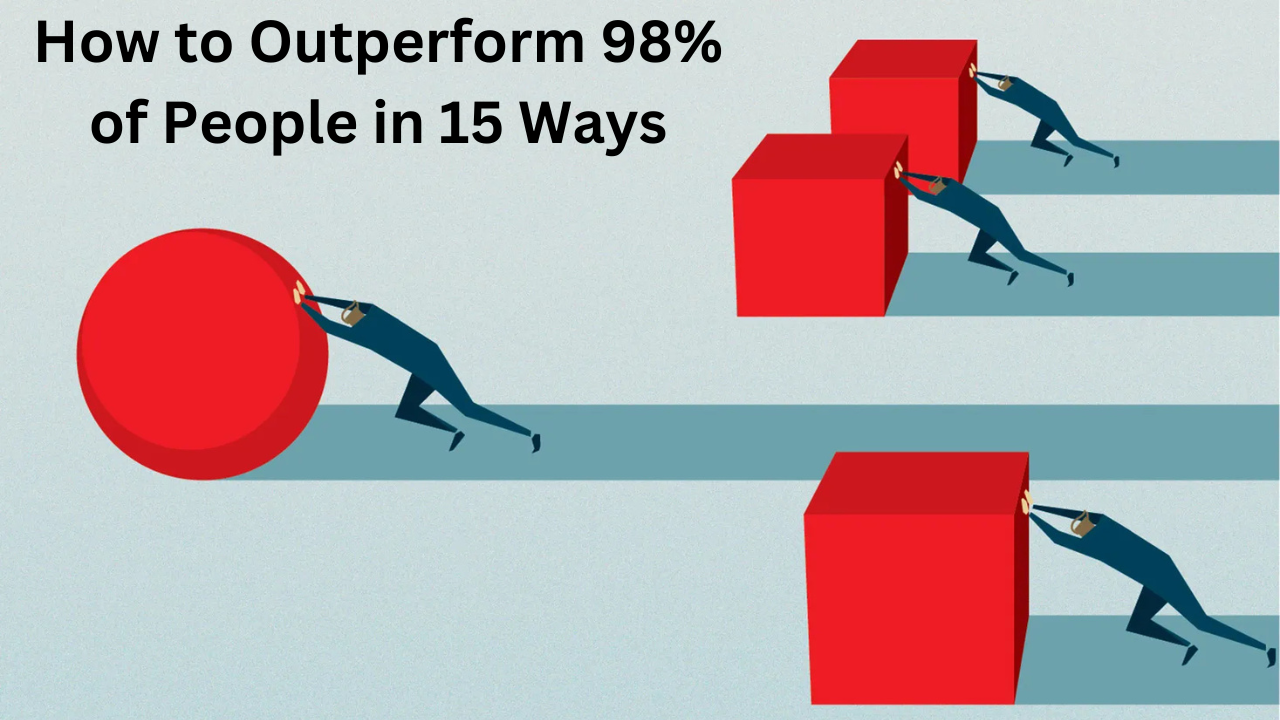
How to Outperform 98% of People in 15 Ways:
98% of people aren’t living up to their full potential they form their opinions Based on superficial things that they hear they can’t manage themselves but They also don’t think enough about themselves.
What they want and what makes them happy are all things that lead to underperformance not by society’s standards but by the way you feel, and that’s stopping you from reaching the things that you’re truly capable of. If you can master and overcome the things that most people struggle with, you will get ahead, so let’s get into it. Here are 15 ways to get ahead of 98% of people.
Get Your Normal Life in Order First:
Starting with number one get your normal life in order first how can you start a new course apply for different jobs or even get married when your everyday life is a hot mess you can’t well technically, yeah you can but it will be a show most people Aren’t help back because they don’t have the skills and opportunities to progress.
They’re weighed down by the chaos in their personal lives the chaos can range from really simple things like a messy home space and a boring unhealthy routine to more complicated stuff like high debt and a bad relationship research shows that romantic relationships at home have a major impact on how people perform at work you can’t work well when you’re stressed about your home life Research by the University of Mexico shows how clutter and mess in your home affect your well-being too as well as what you eat and your mental health.
So before you can do all of the things you have to do to get ahead of everyone else you need to get off the same footing as them and you can do that by creating a structured orderly life with things you can control you want to be more productive well studies show that having a structured and organized life leads to better productivity and mental well-being.
So that is where you start you start with the basics clean up your environment create an interesting but structured routine and fix your relationships most people don’t have this so if you fully commit yourself to fixing these things you’ll get way ahead of them.
Find a Truth that Most People Dismiss:
Number two find a truth that most people dismiss there are some truths out there that we hear every day and we think everyone else is following it so we don’t consider it a gold mine of knowledge but the thing is those people are just like you they make hear the truths but they’re not living by them.
They think it is common knowledge that the rest of the world is following too but if you watch carefully most people are still following the crowd most people are still working with one stream of income that they get working for a company even though we know how multiple streams of income even if they’re small are more likely to grow over time even though.
We know that we live in an era where starting a business is much more accessible and it’s something that you can do in your free time it’s like the experts are shouting at everyone to move differently, the crowd is marching and some people look back but they keep moving on with everyone else you might be that one person who looks back and then turns around sure you might be walking in a different direction.
But the crowd isn’t walking to a destination you want so you’re not missing out on anything here Niche markets are more profitable than Mass ones everyone thinks that AI is going to replace art so people are learning to code but wait think coding is more definitive art is a lot broader AI works well within limits not outside of them.
So in the next few years what’s going to be in demand you find the truths by looking at the things people struggle with by seeing what’s unpopular and why and by following contrarian thinkers like Nasim TB or Peter Teal a small percentage of people understand the value of a truth that most people dismiss and an even smaller percentage follow through with some action on that truth if you follow through you’re Already ahead of most in the world whether you succeed or not and on a similar note.
Be Contrarian Just for the Sake of It:
Number three is contrarian just for the sake of it Irish poet Oscar Wild once said most people are other people their thoughts are someone else’s opinions their lives a mimicry of their passions a quotation if you can move away from that and form your own Opinions.
You’ll get ahead of everyone else you’ll get to know yourself better while everyone else is still unhappy and confused about it and you do that by challenging conventional thinking to be contrarian just for the sake of it not to argue but to see which divisive
things you agree with think about this when most people are planning their holidays they look for Instagram Mable places the top-rated cafes when they’re planning their health.
The journey they look for the best-reviewed diets and exercise programs when they’re stressed they talk about how stressed they are when they’re broke they talk about inflation and the cost of living everyone is saying the same damn thing there are no original thoughts the quickest way to find out what makes you tick is to say the opposite thing to everyone else you’ll eventually start adopting different ways of thinking and You’ll begin to understand yourself outside of what the crowd is following so instead of saying you’re broke because of inflation, you could say you’re broke because you decided to spend a bit more money on organic food.
This month it doesn’t have to be true you just have to get your mindset to move away from what everyone else is thinking and saying that is how you master your emotions your mind and your resilience whatever the world is doing right now isn’t working so do the opposite.

Listen to What Other People Say They’re Afraid to Do, Then Do It:
Number four listen to what other people say they’re afraid to do then do it yourself in conversations with your friends colleagues and networking events stop talking about You listen to other people listen to them talk about their ideas that they didn’t manage to get off the ground listen to them talk about things They’re struggling with and ask them about the things they’re afraid of always ask why are they afraid if one person is afraid then it means there’s a good chance a lot of other People are too so there is a gap for you.
You just have to be the one who isn’t scared when others are too scared to take action that’s when you step into the things that intimidate other people are the things that are going to push you forward there’s a chance for you to seize opportunities.
Because everyone else is playing safe making those bold career moves changing cities and starting that business be part of that 2% who face their fears not the 98% who give Fear a big old hug and allow it to dictate their entire life.
Do it Now If you’re Going to do it eventually:
Number five do it now if you’re going to do it eventually one of the biggest obstacles holding people back isn’t even an obstacle it’s a habit an excuse a pointless mindset I’ll do it tomorrow.
When I’ve got more time look 20% of people are habitual procrastinators 75% of people consider themselves procrastinators it is everywhere and it negatively impacts your rate of success it reduces your self-confidence affects your attitude toward learning and leads to feeling anxious and depressed.
You’ll have the same amount of time tomorrow as you do today all right nothing is going to be different it’s just today all over again and the majority of the world follows this mantra which is great for you okay because that means that to get done you don’t even have to take a massive leap you just have to start by doing the bare minimum the important the word here is start get off the ground no matter how small and imperfect that a small step is because time compounds.
Both action and inaction most people are waiting for the right time that’s never going to come all right if you do it now you’ll be way ahead of them by the time they realize it and start themselves this goes for everything from cleaning your house upskilling yourself negotiating your salary if you can do it now then do it.

Pick Your Hero and Then Consider Them Healthy Competition:
Number six pick your hero and then consider them healthy competition your hero is the person you already considered to be ahead of most of the people at the gym who lifts heavier and hardly seems to break a sweat compete with them the person at work who gets good results and all the praise find out how why and what they’re doing differently your most sociable friend.
Who effortlessly charms everyone watches how they do it sees if you can do it better for everything you want to be better at picking the best person you know to compete with make sure it’s a healthy competition by focusing on what you admire about them research shows that people who have good role models are more likely to feel established in their career they feel more fulfilled.
They’ve got a career that pays enough don’t become obsessed with them don’t judge them and do not copy them use them as a way to measure your progress and keep yourself motivated the day you surpass them is the day you know you have to set your sights a little bit higher.
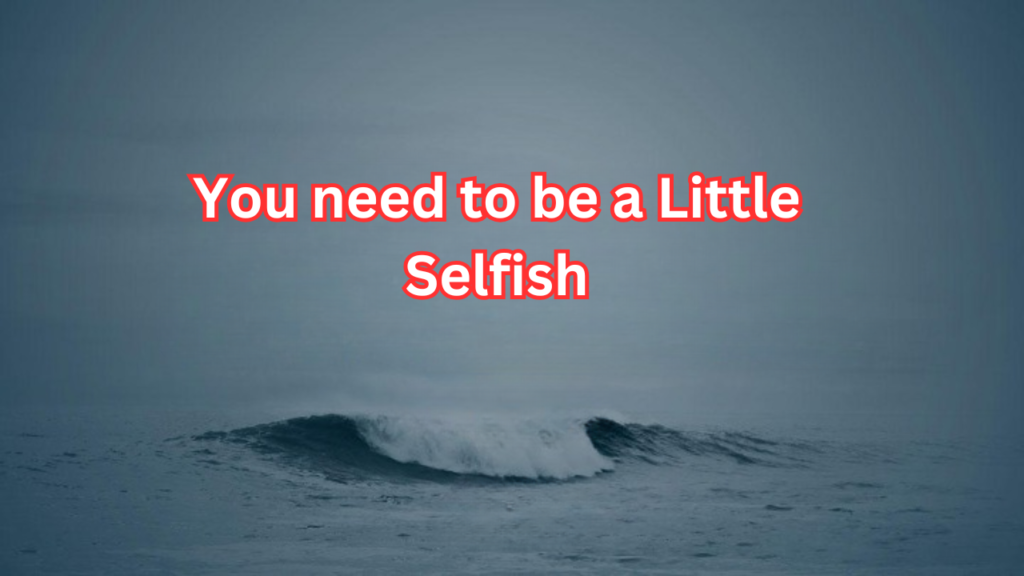
You need to be a Little Selfish:
Number seven you need to be a little bit selfish if you want to be better than everyone else you have to be a little you can’t feel guilty about wanting more money Better Health and being better looking with nicer clothes and a more Charming personality seeing the world as a competition isn’t evil there are perfectly ethical strategies of winning everyone secretly wants more of something.
But they’re scared of being judged for it so they’ll never admit it to themselves if you can admit your most controversial goals to yourself you put yourself ahead of everybody else and you should know that you can’t take care of anybody else if you do not take care of yourself you have to feed yourself first your rise to the top will require some selfishness that doesn’t mean stepping on anybody else it just means that for a short time You have to let go of The Virtue signaling and narrow your focus slightly you can pay everything forward once you found your footing.
Treat Yourself Like Your Best Manager Treated You:
Number eight treat yourself like your best manager treated you if you’ve ever had a brilliant manager, then you know just how much they can inspire you how easily they share knowledge and wisdom, and how much better you feel after a meeting with a great manager who can talk about your weaknesses without making you want to hide away from them they can tell you exactly what you have to do to leverage your strengths and you leave your meetings feeling inspired.
That is how you have to manage yourself you need to have weekly and monthly performance review meetings with yourself just like a great manager you evaluate what you’ve done well where you messed up and what lies in store before the next meeting you encourage yourself you celebrate and show yourself opportunities that you should consider for Progress everyone is auto-piloting through relationships career finances emotions and physical and mental health and this process grounds the autopilot to a halt.

Master Skills that Compound Over Time:
Number nine Master skills that compound over mastering skills is a more action-oriented way to get ahead of people a lot of what we’ve spoken about in the other points is based on your mindset or following one key rule this one takes a bit more work you need to choose one skill and spend the next year mastering it do some research on the 10 most coveted hard skills that will be valuable in the next years read about them.
Write down two or three skills that you like the sound of research how much money people make from them right now look at the predictions for their value in the future you’ll see things like coding content creation data analytics project management and a range of other skills come up quite.
Often so choose one and then for the next year throw yourself into multiple courses to learn about it while you’re doing that you’re also going to perfect soft skills time management confidence communication or diligence look up the most valuable skill and throw yourself into learning about this too.
While these skills are valuable not enough people are paying attention to them yet there is movement but it’s slow and even fewer people are focusing on the combination of hard and soft skills the people who throw themselves into both are going to come out on top these skills compound over time.
So you’re not going to just use them in a company you’re going to use them to create your own thing freelance consult work for yourself you can scale this type of knowledge so that one action leads to multiple results.
Become a Specialist by Putting in 11,000 Hours of Work:
Number 10 becomes a specialist by putting in 11,000 hours of work you know they say it takes at least 10,000 hours of work to become a specialist so you need to put in 11,000 hours that’s a lot of hours we get it most people won’t even come close so whatever you specialize in you can’t just learn about it.
You have to make it your job before you’re even considered an expert that’s the only way you’re going to be able to do it in a reasonable amount of work you can’t wait until you know everything before putting what you know into practice you can’t let your lack of knowledge in the area hold you back from pursuing it only working on your Expertise.
Your spare time isn’t going to cut it okay it has to become a part of your life so you find a way to bring it in think about your experiences and your current career do you enjoy it would you like to throw yourself into it some more or do you want to change direction if you decide to change direction you have to do it fully the specialist is ahead of everyone else if you want to get there you have to find a way to put in 11,000 hours of work that is how you join that 2%.
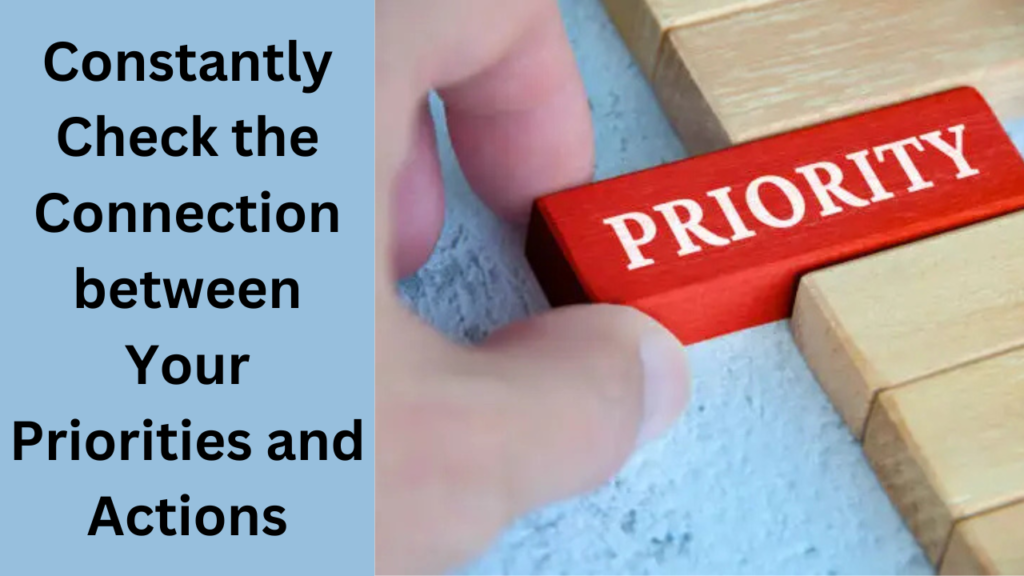
Constantly Check the Connection between Your Priorities and Actions:
Number 11 constantly checks the connection between your priorities and actions your priorities change more often than you realize but even more importantly even when you’ve outlined the things that are important to you it is easy to Veer off track without.
Realizing it’s as if you’re wearing a blindfold when you’re walking a straight path you think you’re moving in a straight line but when you take off that blindfold you see just how far off course you’ve gone checking in to see if your actions match your priorities is like taking that blindfold off it’s like taking that blindfold off the day-to-day chores of Life can derail your plans.
But if you do a quick Check every day or every week you can slot in a step that will get you closer to your goal but an even smaller percentage takes off their blindfolds regularly and does a little course correction you need to get in with that crowd you’ve put yourself ahead by knowing your priorities and planning your actions and now you need to give yourself an extra boost by making little shifts now and then to stay on track.
Downplay the Bad Stuff, Embellish the Good Stuff:
Number 12 downplays the bad stuff and embellishes the good stuff, ah you know This one might make some people uncomfortable but let’s be clear this isn’t about lying or being delusional it’s actually about calming yourself down and doing it in a way that most people don’t do its positive thinking and we know it sounds cliché but studies show it leads to lower blood pressure levels healthier lifestyle chaotic.
Better coping skills for most people when they have a stressful day at work they can’t wait to get home to their partner hop on a call with their parents or head out for drinks with friends so they can vent they talk about their stressors their worries and their
Problems they might feel better for a minute but then later on in the evening everything they spoke about seems even more overwhelming.
When you downplay the problems you take away some of their power and you make your mind believe it’s manageable enough for you to conquer it when you give more attention and gravitas to the good stuff your mind gets a little ego boost and motivation so now you’ve given yourself more resources to tackle a smaller issue you don’t feel as overwhelmed about it.
So you also have more mental energy and Clarity to deal with the problem and make sure it doesn’t happen again everyone else is following the opposite strategy and we can see it is not working for them.
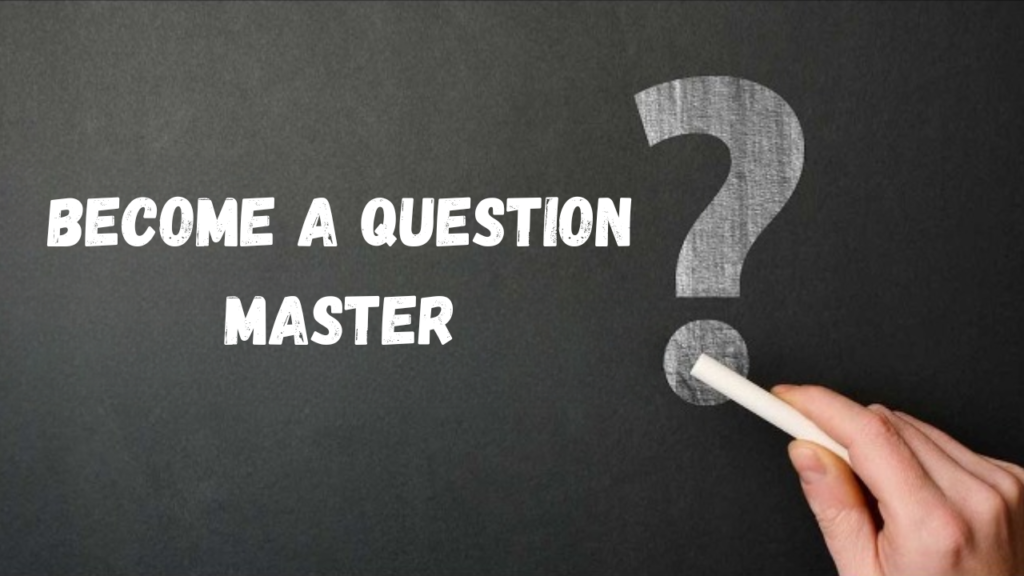
Become a Question Master:
Number 13 becomes a question, Master networking is one of the best but one of The least used strategies in getting better career opportunities are not just because people don’t understand the value of networking and aren’t doing it as often as they should.
It’s because people have no idea how to network they’re treating it like it is some kind of sale walking up to someone you admire at a conference and talking about your brilliant idea and how you would love to join their team is so socially awkward unless you’re brilliant like Bill Gates or Elon Musk kind you need to stop that okay the best networkers are Masters at asking questions and honestly, 98% of people just talk about themselves.
They don’t even know that they’re doing it but people feel great when they talk about themselves they love it when others ask them a genuinely interesting question they’ll feel connected to you not because you were not because you were vulnerable and shared a story but because you were interested in them and they shared something with you so now they’re vulnerable become a question master and everyone will think that you are a fantastic Company.
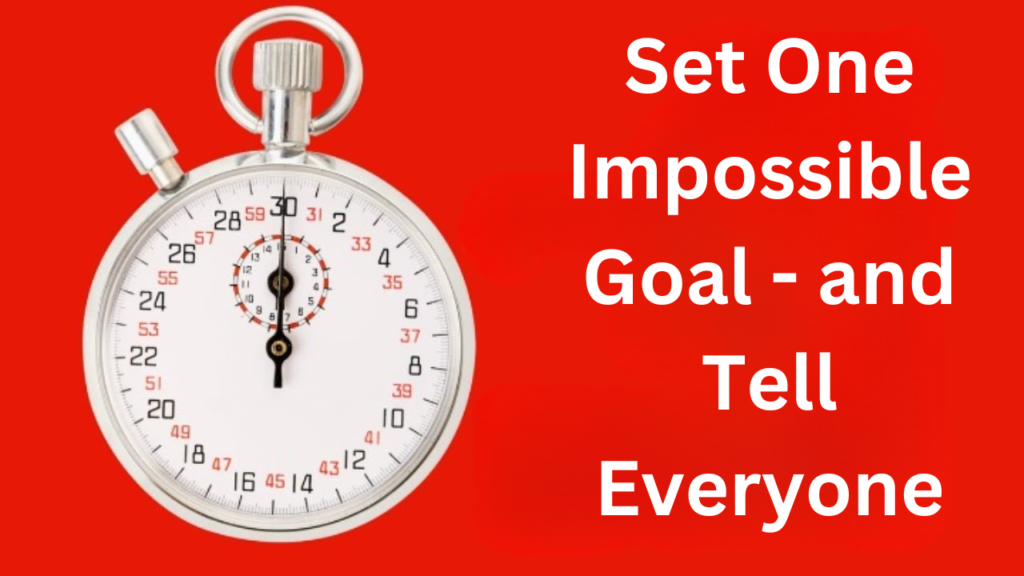
Set One Impossible Goal – and Tell Everyone:
Number 14 sets one impossible goal and tells everyone to keep their smaller achievable goals to themselves or share them with others if they want to that’s totally up to you but for this one for this one huge goal that seems impossible to everyone else share it it might take you a lifetime to reach that goal.
But that’s a great one to have it might be crazy but it’s fun to pursue it and see how far you’ll get it’s also fun to see people’s reactions and disbelief when you tell them that disbelief and doubt are like fuel for you to keep pushing toward that impossible goal have some ambition and pair it with a decent amount of work see how far you can get and then keep going further than the goal alone will set you apart in the steps toward it no matter how small Leap Frog you forward.
Become a Master Storyteller:
Number 15 becomes a master storyteller people are terrible communicators, truly they have no idea of how to convey their ideas in interesting ways they hesitate they add Caveats to their pitches and bring in details that don’t even matter sometimes.
It’s because they don’t know what they’re doing but a lot of the time it’s because they don’t know how to get their message across there’s a method to storytelling a formula to follow that will entice people to claim their doubts and make them believe that you know.
What you’re doing if you can master that then you’ll be able to persuade influence and Inspire the people around you will be at the top part of that 2% and everyone will be looking to you for the next move and that’s all.
Conclusion:
The article presents 15 strategies to outperform 98% of people by improving self-discipline, productivity, and mindset. It emphasizes the importance of organizing personal life, challenging conventional thinking, embracing opportunities that others fear, and mastering skills that have compounding benefits. Through deliberate action, introspection, and resilience, these methods encourage individuals to overcome mediocrity and achieve personal and professional success. Key themes include setting ambitious goals, becoming a specialist, and fostering creativity, all of which require courage and consistent effort.
FAQs
- What is the first step to getting ahead of others?
Begin by organizing your personal life. A structured and orderly environment enhances productivity and mental well-being, which serves as the foundation for further growth.
- Why is mastering a single skill important?
Mastering a skill, especially one with future relevance, not only builds expertise but also creates compounding benefits, making you valuable in professional settings and beyond.
- How can I overcome procrastination?
Take immediate action on tasks rather than delaying them. Starting small but consistent actions today prevents the compounding effects of inaction.
- What does it mean to be “contrarian for the sake of it”?
It means challenging conventional wisdom and adopting a mindset that diverges from the majority, which can help uncover unique opportunities and foster self-discovery.
- Why is setting an impossible goal beneficial?
Pursuing an ambitious, seemingly unattainable goal pushes you beyond your limits, provides long-term motivation, and sets you apart from others, regardless of whether you achieve it.
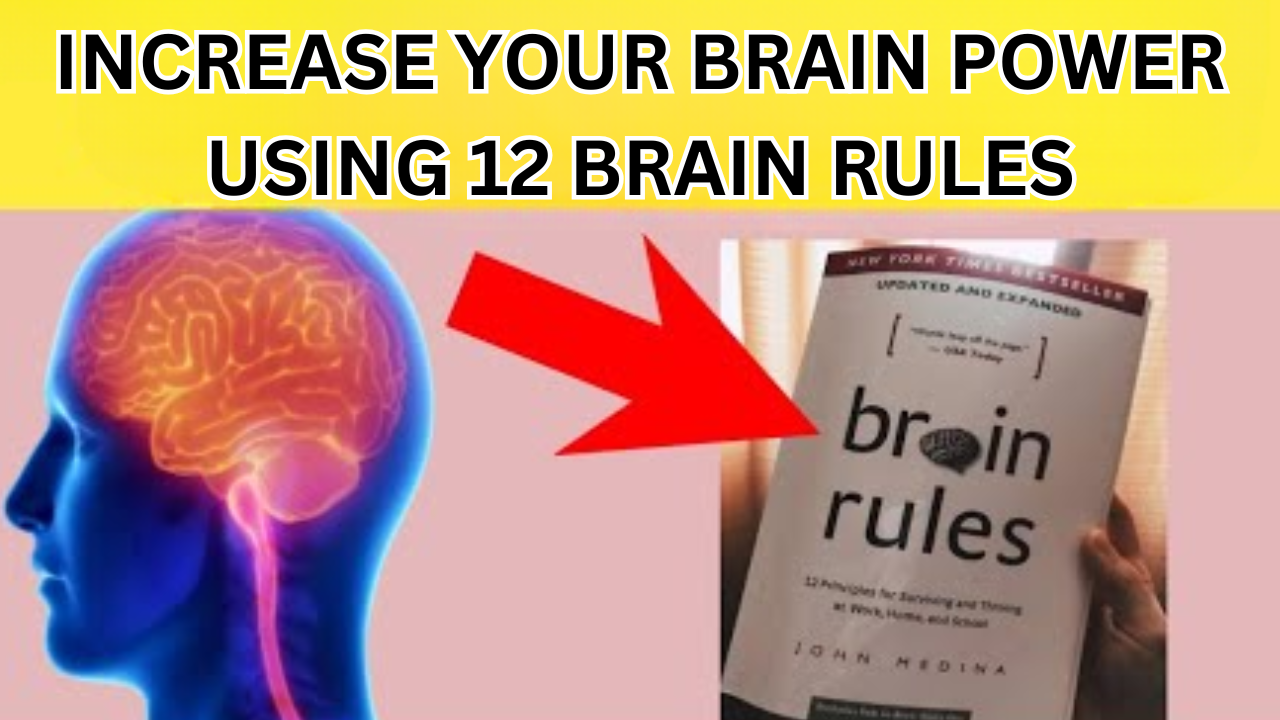
INCREASE YOUR BRAIN POWER USING 12 BRAIN RULES:
Have you ever wondered why some days your mind works at a great speed and sometimes it seems that it is moving in slow motion, that is, your mind is not completely in your control, that is why today we will talk about molecular biologist John Marina’s book Brain Rules, which reveals such 12 powerful brain rules that can transform your thinking, learning and overall life. From better memory to improving focus, this book tells the way to unlock the hidden potential of your brain so that you can take your brain to the next level. So let’s start.
Rule no 1 The Human Brain Evolved:
Let’s simplify science and start from the first rule, rule number one The Human Brain Evolved According to Darwin’s Theory of Evolution, we have evolved from monkeys to humans, which took billions of years, but these changes were not just physical, our brain has also evolved with time, that is, it has developed. Our brain has been created for survival to solve these problems and Designed to survive in unpredictable environments First we had the lizard brain which controlled basic functions like breathing Then came the cat brain which controlled the brain
which handles our emotions and fear Whenever there is danger, the brain reacts Then we developed the cortex which is a powerful part of the human brain It helps us understand complexities Because of this evolution we humans have become experts in problem-solving Understanding the thoughts of others Working in groups We were able to dominate our unconnected world.
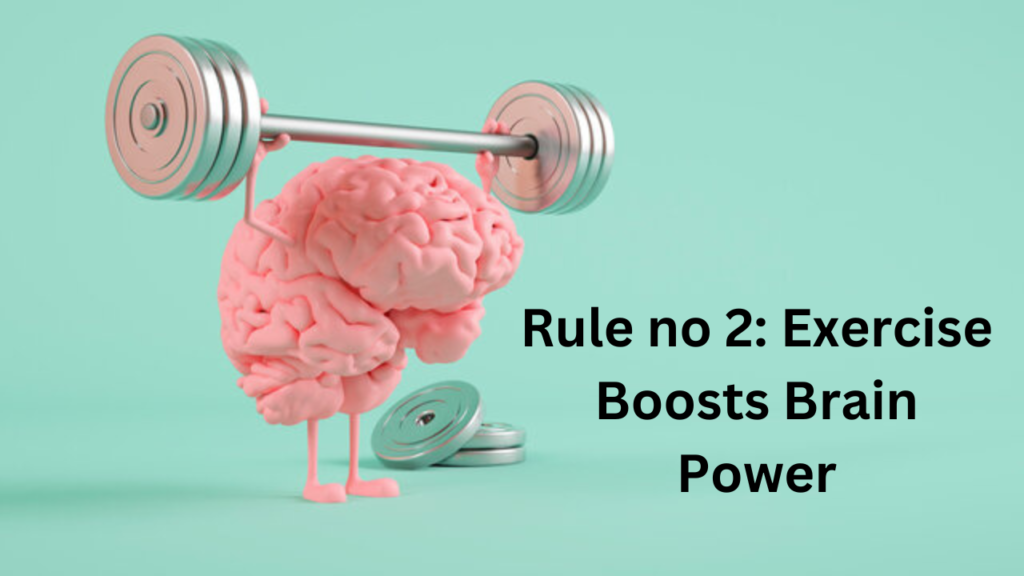
Rule no 2: Exercise Boosts Brain Power:
Rule number two Exercise boosts brain power Movement is our brain’s best friend During evolution our ancestors used to move all day They used to roam around hunting and this movement kept their brain sharp Today
Our sedentary lifestyle does not give the human brain the movement it needs When we exercise our brain gets glucose and oxygen which keeps the neurons alive and creates new ones Builds brain cells Harvard psychiatrist John Ratey says exercise works like Miracle Grow for your neurons. Miracle Grow is a plant fertilizer that helps plants grow and become healthy. In the same way, exercise works like a fertilizer for the neurons in your brain. When you exercise, your brain releases a chemical called brain-derived neurotrophic factor that helps neurons grow and repair.
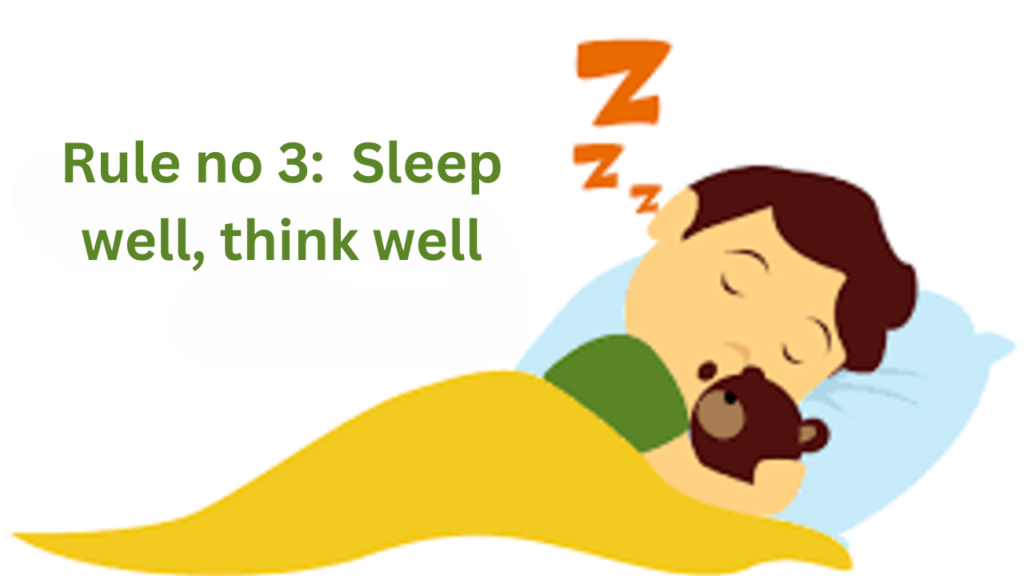
Rule no 3: Sleep well, think well:
Rule number three: Sleep well, think well. Sleep is king. When we sleep, our brain processes the day’s information, sorts it out and turns it into memorable memories. Without sleep, your brain slows down. Your decision-making ability and memory both weaken. A Harvard study shows that if you are sleep-deprived, your reaction time and cognitive ability decrease by up to 40 percent, and proper
sleep improves your creative problem-solving skills and learning. There is a lot of improvement. DJ Peter Tripp from New York hosted a marathon radio show without sleeping for 200 hours. The result was that he started having seizures. His brain started showing wrong images and scenarios. His mental state deteriorated so much that it became difficult for him to differentiate between reality and imagination. Therefore, proper sleep not only makes you fresh and alert but also recharges your brain and maintains its functioning.
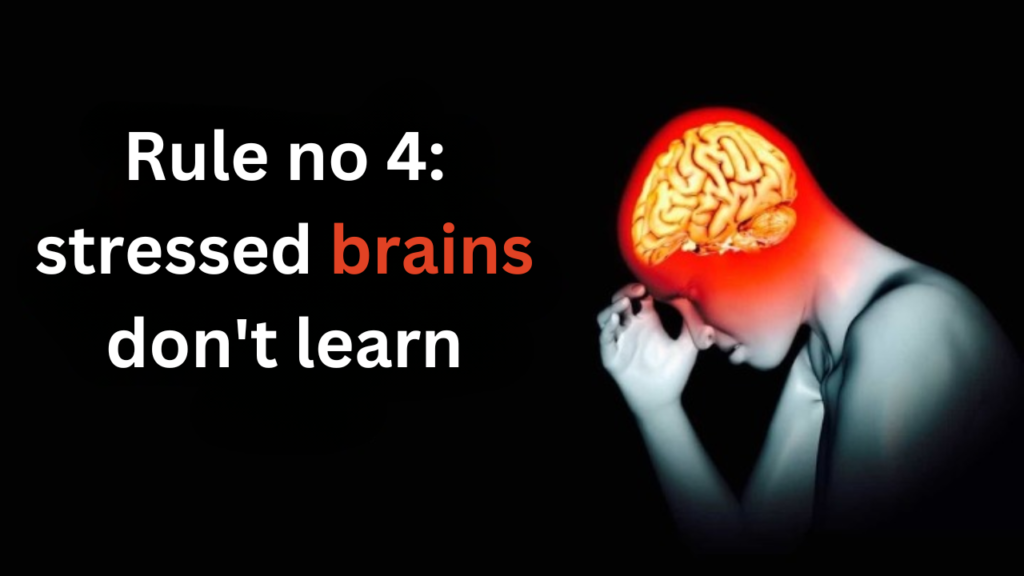
Rule no 4: stressed brains don’t learn:
In the same way, when we are stressed, our body goes into fight or flight mode, and chronic stress damages important areas of our brain. Research says that chronic stress shrinks the hippocampus, which directly affects your memory and learning abilities. This damage can be long-term. Therefore, it is very important to manage stress. This study shows that during stress, the neurons of our brain do not fire properly, which affects problem-solving and creativity. In a famous experiment, a German
Shepherd was given electric shocks but even when he had the option to run away, he did not react because the stress had damaged his brain so much that he froze. This is the impact of stress on our brain. That is why stress management techniques like mindfulness and exercise are very important.
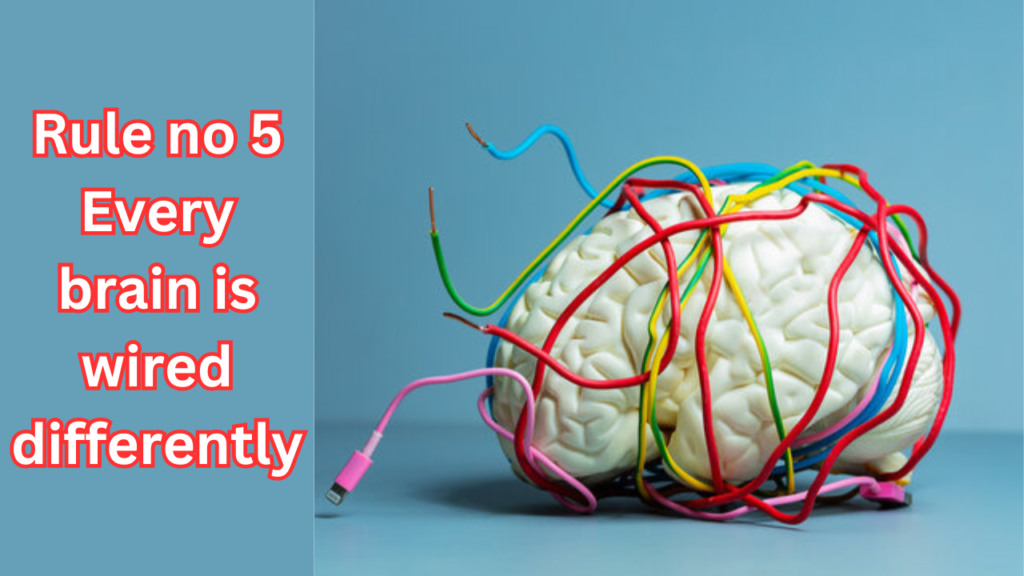
Rule no 5: Every brain is wired differently:
Rule number five: Every brain is wired differently. Every person’s brain is unique. We all think differently, learn differently and all this happens because of our brain wiring. The way you process information is
You evolve through your personal experience and learning. Neuroscientists have proven that when we learn new experiences and skills, our neurons make new connections. This process is called brain plasticity, which helps you to continuously evolve and adapt. That is why every person’s learning ability is different. Let’s take the example of Michael Jordan. He was the biggest champion of basketball, but when he tried to make a career in baseball, he could not succeed because his brain was wired for basketball but not for baseball. Every person’s talent and learning capacity depends on his brain wiring.
Rule no 6: We don’t pay attention to boring things:
Rule number six: We don’t pay attention to boring things. Our brain pays attention only to those things which are either interesting or emotional. Paying attention to boring things is a struggle for the brain because our attention span is limited. In today’s time where there are so many distractions, our brain Focuses only when something is emotionally engaging or exciting. Research shows that our attention span is around 10 minutes. If after that you do not find anything interesting or engaging, then your brain starts losing attention. To activate the reward system of the brain, some exciting or emotional inputs are necessary. If you are sitting in a class or meeting and you find something boring, then after 10 minutes you automatically zone out. Many times we forcefully pressure ourselves to do such tasks which are boring for us and then we keep failing in them again and again. To avoid this, make those tasks engaging by doing anything so that you can remain fully focused.
Rule no 7: repeat to remember:
When If you want to remember something new, just reading or listening to it once is not enough. You have to repeat that information again and again so that your brain can store it in long-term memory. Studies show that when you repeat something in spaced intervals, your memory improves. Your brain needs continuous exposure so that the neurons can make strong connections. Do these spaced repetitions. You have to memorize a topic for the exam. If you study it for just one day, you will remember it in the short term but you will forget it in the long term. But if you revise that topic a little bit every two to three days, then the brain will store it in long-term memory.
Rule no 8: Stimulating the more senses:
Rule Number 8 Stimulating the more senses it uses, the better it processes the information. When you experience the same thing through multiple senses like seeing, hearing, or touching, then your brain stores that information better. The more senses you develop, the stronger your memory will be. In a study, people were asked to memorize a list. When they were just asked to read it, when they were shown the same information with visuals and they got a chance to interact with it, their recall was much better. That is why we remember the stories of movies and TV shows better because we watch, listen, and experience them. If you are just reading something, then only a limited part of the brain is active, but when you watch or listen to that thing, more areas of your brain become active, which makes learning and memory more effective. And if we talk about the most powerful sense, then it is vision.
Rule no 9: Vision tames all other senses:
Rule number nine. Vision tames all other senses. Our brain spends 50% of its energy in visual processing only. When we see something, the brain converts that visual into a story which gets stored strongly in the memory. Vision is called the super sense because visual learning is the most powerful way to remember information. In an experiment, people were told a speech but without visuals, they quickly lost interest. When visuals were added, people understood the information more effectively and also remembered it. This proves that our brain gives priority to visuals and that is why images or videos are more important in our mind.
Rule no 10: Study or Listen to Boost Cognition:
Henry was a 92-year-old dementia patient who was completely unresponsive for years. He had lost his memory and personality and the doctors also considered the chances of his recovery to be very low. But when his favorite music was played to him, a change was seen. He suddenly started singing, started remembering his old memories, and started remembering his old memories. Music has started showing its effect on actions as well The effect of music is not limited to just emotions It also boosts the cognitive functions of the brain Studies have proved that music improves memory, attention, and learning skills Music has a direct connection with multiple regions of our brain which activates memory and focus and enhances overall cognitive performance Research says that specific types of music like classical music synchronize the firing rate of neurons which improves problem-solving and concentration Music therapy is also helpful for those who have memory related issues like dementia.
Rule no 11: Male and female brains are different:
Rule number 11 Male and female brains are different for all of us. We know that the way of thinking of men and women is different, but this is not only due to upbringing or culture, science says that the structure and functioning of their brains is also different. That is why the way of processing stress, emotions, and memory is different for both males and females. Research shows that during stress, the right amygdala of men is activated, which helps them to understand logically, while the left amygdala of women is activated, which helps them to remember emotional details. That is why in stressful situations, the reaction of men and women is different.

Rule no 12: We are powerful and natural explorers:
Rule number 12 we are powerful and natural explorers we have all been curious since childhood. Touching, seeing, and understanding everything is an instinct of our brain. When we explore new experiences, our brain makes new neural connections, which make us smarter and more adaptable. This is very important for our growth and learning. Research says that the hippocampus of the brain the campus that controls learning and memory grows only when we seek out new experiences. This ability helps us to adapt to every new situation.
Neuroscience proves that our brain is always wired to learn and explore something new. Think of a small child. Even when the parents forbid it, the child still explores things because his brain naturally wants to learn.
Conclusion:
The document highlights 12 brain rules from molecular biologist John Medina’s book Brain Rules, aimed at enhancing mental performance. These rules emphasize the importance of evolution, exercise, sleep, stress management, individualized learning approaches, repetition, sensory engagement, vision prioritization, music, gender differences, and exploration. Together, these principles provide a practical guide for improving memory, cognition, and adaptability while promoting overall brain health.
FAQs
1. How does exercise impact brain power?
Exercise boosts brain function by increasing the flow of glucose and oxygen, which nourishes neurons and promotes the growth of new brain cells. It acts like “fertilizer” for the brain, enhancing learning and memory.
2. Why is sleep essential for cognitive performance?
Sleep allows the brain to process daily information, convert it into long-term memories, and recharge. Sleep deprivation impairs memory, decision-making, and problem-solving abilities, reducing reaction time and creativity.
3. How does stress affect learning?
Chronic stress damages the hippocampus, a critical area for memory and learning. It reduces neuron activity, stifling creativity and problem-solving. Stress management techniques are essential to mitigate these effects.
4. Why are visuals more effective for memory?
The brain dedicates 50% of its resources to visual processing, making vision the most dominant sense. Visual learning is impactful as it creates strong, memorable connections compared to text or speech alone.
5. Are male and female brains different?
Yes, male and female brains differ in structure and response to stress. For instance, men process stress logically through the right amygdala, while women focus on emotional details via the left amygdala, leading to varied reactions.
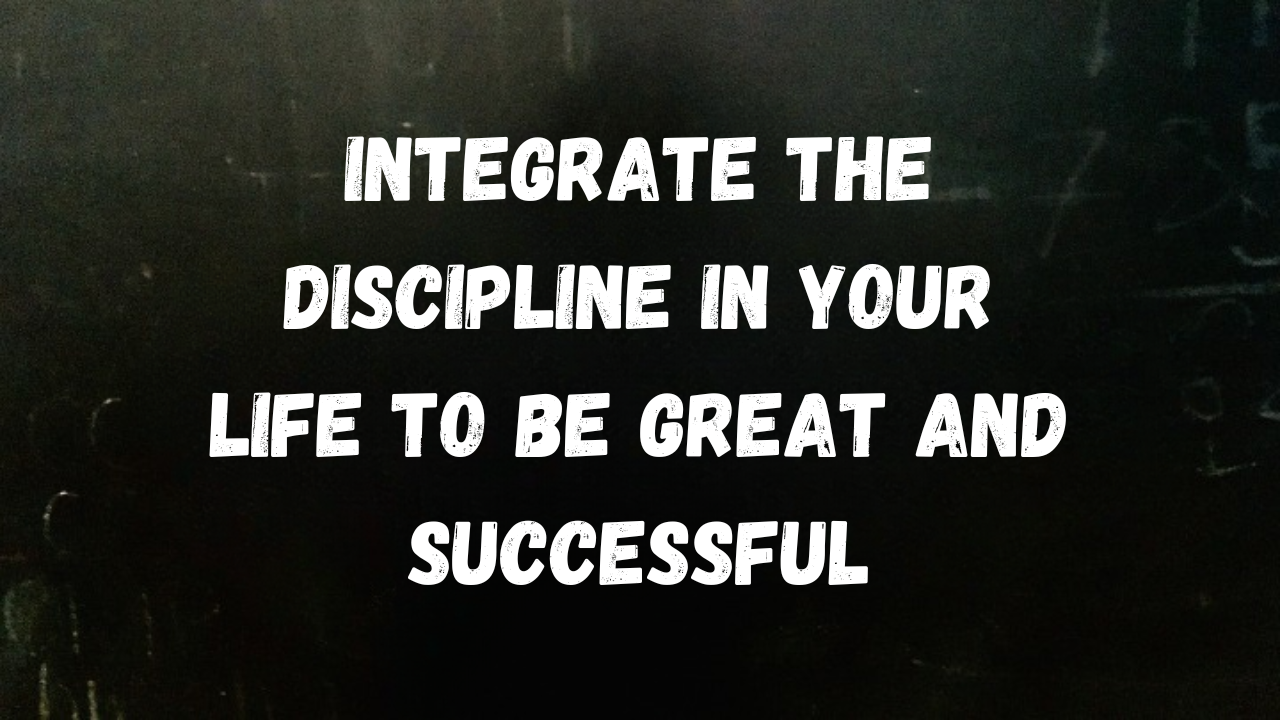
Integrate the Discipline in Your Life To Be Great and Successful:
The Power of Discipline by Daniel Walter explores the importance of self-discipline in achieving success and personal growth. It emphasizes that while talent and intelligence are valuable, discipline truly sets successful individuals apart.
Understanding Self-Discipline is the ability to push yourself to take action, regardless of how you feel emotionally. It helps you stay focused on long-term goals by consistently taking small daily steps.
The Neuroscience Behind Discipline The article explains how the brain works, particularly how habits are formed. Walter breaks down the role of dopamine, the “reward chemical,” which helps develop discipline through positive reinforcement.
7 important rules for discipline:

If you start following then you People can bring such discipline in their lives asked what is the Rules Doctor Book smiled and said Patience you will know all the rules but Before that, my condition is that all seven will listen to the rules because all these rules should be followed by one to another Comply.
There are two ways to make a pay line first you stop doing those works that you should not do and second, you do more of those things that are good for you. Let us understand these seven rules by the story of two friends Sara and Simon.
Rule: 1 The Practice of Urge Surfing and Controlling Impulses:
It will tell you how you don’t do those things which you should not do under this rule The author has told in the book which is called The Practice of Urge Surfing and Controlling Impulses. Ok, tell me both of you what is that thing which you people sometimes want to not do but still you keep doing it.
Sara immediately got excited and said reel Scrolling I keep scrolling reels all day and many times I want that I don’t scroll reels and do my work important but even if I don’t want it, my mobile comes out of my pocket and in reels, I waste a lot of time, this is the thing.
I want to remove from my life I want I am Dr. Book, who said right in my journey of discipline, one thing that will challenge you the most is your Impulses, that little voice that comes in our mind many times and says that mobile pick up, let’s watch the reels, let’s watch one more episode, let’s eat one more slice of pizza to fight these impulses.
To fight this, there was a psychologist named Ellen Bartlett, developed a technique to fight this, which is called the urge Bartlett told me that you have to look at urges like the waves of the sea, when a wave comes, it is small at first, then peaks but It goes up but then falls again.
Similarly, our impulses are also there when we get any impulse, it is initially very strong but if you give it a little movement, give it a little time, and instead of listening to the impulses, just observe it, it will help you a lot Then the doctor told him about a patient named Jennifer who was a working professional with whom there was a problem that she used to follow her diet well throughout the day but as soon as night came, her patience started breaking her diet used to get spoiled in the evening and she used to start eating junk food.
Because she had a lot of temptations at night and then I told her the technique of urge Surfing. I told her that whenever you feels like eating junk food she just stops for 10 minutes and observes the thoughts coming into your mind without judging them no, doing this thing in the beginning was a bit difficult, and a bit stupid too.
But because I told her to do it, she seriously did it and after some time she came and told me how when she started following this 10-minute ritual whenever an urge came, she noticed that yes, starting For some time it felt like eating a lot, at that time.
If he does not lose his desire and does not give in a little then that desire automatically starts to reduce Doctor Book also asks them has it ever happened to you people that you felt like eating something a lot but because of some reason it took time, maybe you got late in reaching that restaurant or something happened due to which the time increased and after that, your desire started to reduce before and when that food came in front of you then your desire to eat that food completely reduced has this ever happened to both of you It is said.
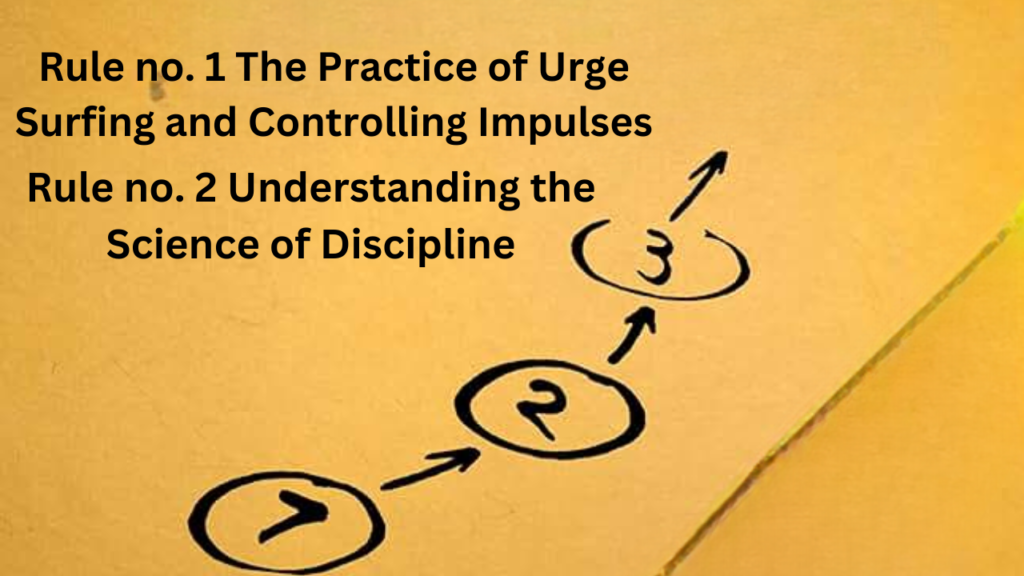
Rule: 2 Understanding the Science of Discipline:
The doctor said there is a science behind discipline. Your rule number two is also the discipline of Understanding the science of learning. The camera placed an offer in front of some participants.
The offer was that you have two options. If you want, you can take $100,000 right now or If you wait for 10 years, I will give you $100,000 instead of 1 million dollars. Now when this offer was placed in front of people, most people without thinking chose the option of 1 lakh without understanding.
Because getting the reward right away seemed more attractive to them. This experiment was being conducted at the same time while their brains were being scanned. When this scan happened, some interesting things came to light and people immediately chose the offer of getting the reward.
It was in their minds that The centers of impulses were quite lit up, but for those who were willing to wait, two different parts of the brain called the ventral middle prefrontal cortex and dorsolateral prefrontal cortex started working which are also used in self-control and decision-making processes.
Basically, from this experiment, they found out that when we run towards an immediate reward, then the ventral stem atom of our brain works, whereas if you start thinking consciously and think about the later benefits, then the pre-frontal cortex works more.
The amazing thing now Simon, after hearing this got a little confused, he felt good after hearing it But he said, Doctor, what will we benefit from this if we understand this thing, then the doctor said, look, this experiment revealed that two different parts of our brain which are for immediate reward a different part works which is called delay a different part works for gratitude means if we train that part of ours, pre-frontal cortex, then delay.
It will become easy for us to do certification now it is like going to the gym, you saw there must be many people who go to the gym but They don’t hit their legs, they skip leg day If they do, then their upper body is very strong but their legs are weak about which a lot of jokes are made, right, they said yes, a lot of people are made fun of like that.
When you put that part of your brain to work more which is the pre-fundal cortex and practice it more, it will be stronger and as it becomes stronger, you will be able to do more disciplined things, so this means that start training your discipline muscle not doing it instantly graciously, do you watch shorts reels or instant will be strong on the other hand.
If you start practicing self-control by doing small things, whether it is setting long-term goals and working on them saving money daily, weekly monthly building your own business, or working on your health, anything If you work on something that strengthens your self-control muscle then it will directly or indirectly help you in bringing discipline in all other things and this thing is very powerful.
For example, if you want discipline in business then you don’t need to bring discipline only in business if you enjoy going to the gym, and If you can bring discipline in the gym then indirectly by bringing discipline in the gym your business discipline will also increase and this is mind-blowing and this is you have to understand science to bring discipline.
So tell me now for discipline which is the easiest thing that you can do enjoy and you can do for a long time Simon said I like playing cricket so the doctor said ok do one thing start playing cricket with discipline and Sara said I like swimming so the doctor said to start at least bring discipline in swimming Do it regularly.
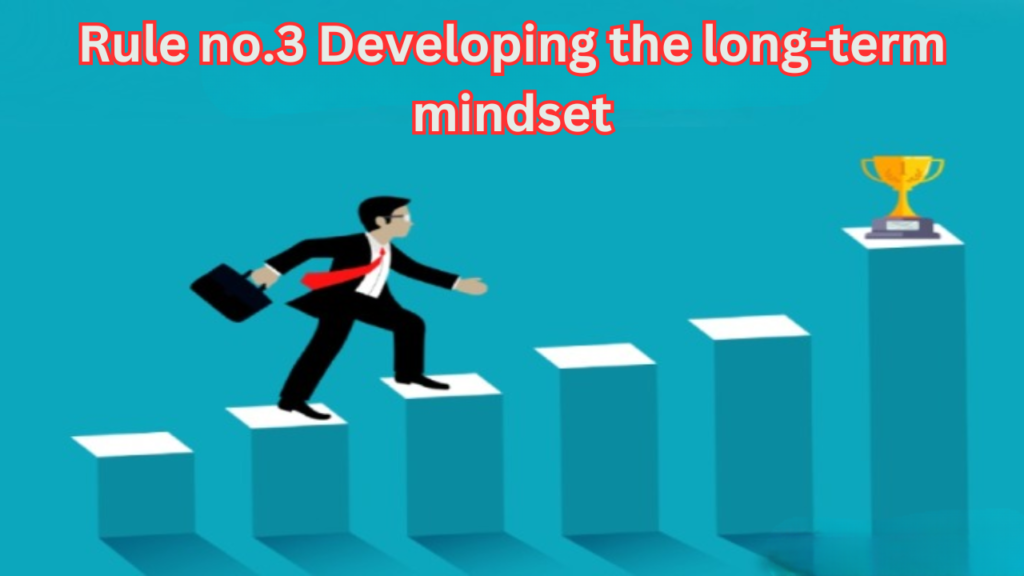
Rule: 3 Developing the long-term mindset:
Rule number three which is developing a long-term mindset Doctor Book asks both of them whether they know any famous person who has made a lot of money by thinking of long-term investing both of them said together.
But do you know that Warren Buffett’s long-term mentality, a mindset that was not developed just like that there is an interesting story behind it? When Warren Buffett was just 11 years old, he bought his first stock but he also had this instant gratitude which is why after some time he started seeing some profit in that stock so he sold that stock and earned some profit after a few years.
He realized that if he had waited a little longer then if he had waited the same stock for which he had made some little profit, he would have made 10 to 20 times more profit if he had thought long-term and this proved to be a very big lesson of his life.
After this, Varun Buffett trained his brain on how to play the long-time investment game and not go after instant great fours like most people and this you can say became a core that made Varun Buffett So much Made you rich which is called a marathon the Mindset Doctor said you both are yourselves Think about a marathon runner and a sprinter There is a difference.
A sprinter has to run fast for some time he runs with all his might but in a short while, he gets exhausted and gets tired due to which he has to rest whereas marathon runners distribute their energy very wisely maintain a pace, and slowly move towards their goal.
Because they have to run for a long time you will have to adopt a mindset. The more you start thinking long-term, the more there is a chance that your discipline will also increase. The more you people think short-term about things, the weaker your discipline will be.
On this, Simon asked, does that mean you are saying that if I set short-term goals like I want to become a millionaire in a month or a billionaire in 1 year then it is not good? The doctor said yes, if you people run after short-term things, then this thing will weaken your discipline muscle.
Whereas the more you think long term and learn to be patient and you will keep working. That much Your discipline will develop and don’t worry There is an easy way to do this which You will understand.
Rule: 4 Daily Habits Routines:
Rule Number Four Daily Habits Routines You Both have heard the name of Mike Tyson who is a legend in the world of boxing now maybe you know about him But one thing you might not know is that He used to follow his training routine religiously and it was not that he liked training he hated training.
He himself said
“ I hate Every minute of training but I said to Myself don’t quit the journey now and live the Rest of your life as a champion.” When the whole city used to sleep Even then Tyson used to run on a deserted road be it rain or cold He used to follow his routine He never took a break and this was the power of routine which made his discipline, and his body so strong that in the ring he became a beast and it is not just Tyson.
This is not the case with Barack Obama and Bill Gates, all of them have daily routines, USA’s ex-President Obama used to start his day with exercise every morning the routine was fixed, no matter how busy he was his whole day, he never started his morning without exercise even.
Bill Gates had a routine of exercising on the treadmill time watching educational DVDs, now these things do not only make them safe and physically fit Mentally, they also make their discipline muscle stronger and there is research from Harvard University behind this.
Whenever you have a structured morning routine it activates the pre-frontal cortex of your brain, the same part that we talked about in rule number two which is responsible for self-control and willpower every morning when you take any action with discipline, you create a psychological momentum which then helps you to make disciplined decisions throughout your day like for example, with you guys Also This must have happened to me many times.
Whenever I wake up in the morning what I have decided in the morning like going to the gym Swimming, reading a book Journaling, I start my day with a positive start then I have noticed that it helps me make better decisions throughout the day and disciplined decisions.
But if I start any morning with laziness without any routine start watching videos early in the morning then the whole day becomes difficult for me to take good actions, does this ever happen with you people nodded their heads yes it happens sir Dr. Book said: It is like a domino effect if we take a small good action then a small good action helps in bringing down big actions.
If this domino goes on the negative side then it creates negative things that is why it is very important for you people that you should follow a routine every morning even if it is 10 minutes that routine may be of 5 minutes but it is very important to have a routine and in that routine.
Rule: 5 The Power of Gratitude in Discipline:
Rule number five which is the power of great doodle discipline come on Let me tell you both a story of an interesting client of mine His name was Ravi. Ravi was also like most people, he was very impulsive.
He used to do a lot of unnecessary shopping and eat junk food and he could not control anything he could not achieve so I told him to do one thing which is called Gratitude Doodle. I told him that he should include in his routine every morning a 5-minute gratitude exercise and write down five things for which he is grateful when I told this to Ravi.
He got a little confused as to what it meant What does discipline have to do with it but still because he respected me and I insisted that you have to do it so that’s why he started doing that thing with confusion.
After a few weeks when he came to me, he was very happy. He told me that doctor when I first started exercising, I felt very stupid because I wanted discipline in my life but you were making me do it with a great attitude but still.
When I started doing this thing slowly, I started focusing on the blessings in my life. I started noticing my impulsiveness automatically I started noticing that it wasn’t that, that gradually started decreasing and the reason for this was because now my attention had shifted from things that I don’t have to things that I want and started coming to things that I already have.
I used to go shopping for many things because I wanted to feel good about myself, I used to eat junk food because I wanted to feel happy but when I started expressing great expression, I realized that I already had a lot of things to be happy, I don’t need to buy new things to be happy. You don’t need to eat useless things to be happy Instead, to be happy, I need to work on my health which will give me more happiness in the long run.
Similarly, I focused on doing those things that aligned with my long-term goals, and this thing, believe it or not, started bringing discipline in me and now a very important part of Great Doodle has become Doctor Book said that look, this story that I have told you has research behind it.
In a neuroscience study at UCL, it was seen that when you practice Gratitude All those areas of your brain that are responsible for emotional regulation are also responsible for self-control specifically, they found that Great view practice increases activity in the medial prefrontal cortex which we talked about earlier and when that happens we start to move away from impulsive choices which directly or indirectly improves golf focus.
So if you guys can’t figure out what routine you should follow in the morning then one thing you should start doing is Gratitude and you can do that by journaling You can do it by praying, and remembering God Or you can do it through whatever method you feel is right.
Rule: 6 willpower fatigue:
But put it in Definitely and follow rule number six along with it Do Will Power Fatty and Managing Mental Energy In 1996, psychologist Will Bister did a study that helped people understand the true nature of willpower.
The experiment was very simple and basic for some participants, two things were placed in front of them. On one side were Freshlicious radishes and radishes. Now people were divided into two groups.
The first group was told to eat only radishes while the other group was told to eat cookies or whatever they felt like eating because of this many people ate cookies. Now after this, both groups were given a challenging task.
The puzzle was given to solve and the result was somewhat interesting. Those who were in the group that ate radishes, made it very hard, which was almost impossible, they gave up within a few minutes, whereas the other group who got the chance to eat cookies, took a comparatively long time to solve the puzzle and did not give up easily.
So Simon said, that means we should keep eating cookies. The doctor smiled and said, no, listen to the whole thing. This also revealed that willpower is an It happens many times like a muscle sometimes if we use people too much they get tired and then they don’t work properly after that now the group of people was given radishes and cookies.
They only got a chance to eat the dishes those people had used a lot of their willpower in not eating the cookies and because of this when a challenging task came in front of them then they gave up very quickly.
Sara asked what should we learn from this experiment, Dr. Book said that look, we should understand from this how important it is to take breaks You know Steve Jobs always took breaks and mindful practices in his routine when he was working at the top position of decision-making at Apple.
He observed that his willpower could be sustained only when he gave his mind some free time and another very interesting example, is Ariana Huffington who is the co-founder of Huffington Post. At one time she was so overloaded with work that she fainted in her office after which she started doing a revaluation.
This helped her mind the research was done and one more thing Interesting thing was that because of this their productivity and discipline both increased a lot That is why the crux of all the things is that you guys should also understand the fatigue of willpower and according to your capacity You should also give yourself free time and give yourself mental breaks to get that you guys can do many things like take a 5-minute walk or meditate or play a game, or whatever you want to do, do it but do it consciously and give your brain a break.
Rule: 7 Embracing Discomfort:
The most important is this last rule Understanding what is embracing discomfort and negative emotions.
Have you heard about Michael Phelps?
He must be one of the greatest swimmers in the world who has won so many gold medals that many countries Can’t win.
What happened to Michael Phelps once?
You know, once when he was in an Olympic race, his goggles got water in them, because of which he couldn’t see anything. At that time, most people would have panicked and lost the race.
But you know, even after having this problem, he didn’t lose focus. He completed his race and did not just complete it. He won and not only did he win but he also made a world record Simon and Sara asked how this happened Well, it happened because Phelp’s coach had deliberately made Phelps practice many times by putting water in his goggles and made him practice in such a way that he could swim without seeing.
He wanted an unexpected situation may come up time so that he should be ready for it and guess what because of this deliberate discomfort when this thing happened, then he performed so surprisingly that he made a world record.
Look! Maximum people who run away from discomfort whenever they face a tough situation, try to run away from it or avoid it, but people like Michael Phelps who are super powerful people who achieve extraordinary things in life, love discomfort instead of hating it.
Have you heard about David Goggin’s too they must be deliberately going into uncomfortable situations again and again, they say that every day if they wake up in the morning and have to run and sometimes it rains, then they run more Deliberately They run in uncomfortable situations.
They keep putting themselves in a lot of situations again and again Even after earning a lot of money, they keep doing such things By going to the jungle in a helicopter Going with the brigade and extinguishing the fire there Running such races where life can be lost They do all these things deliberately.
Why because he loves discomfort they embrace discomfort as a life Even after fighting, he is a man afraid of rejection He was very afraid, he was afraid of hearing a no So do you know what he decided that he would take a challenge 100 days rejection challenge.
Where what he would do every day was intentionally do something for which he would get a no, for example, going to a stranger and asking for $100 taking it if he is traveling by airplane then requesting the air hostess that I will give safety briefings going to the mall.
To use their communication system asked for things in big shops went to branded shops and bargained by asking for discounts he did many such discomfortable things intentionally but He achieved many things in his life and became a famous person This is the last lesson.
If you want to achieve discipline in your life then instead of hating the discomfort of all those tasks, start loving them those people who can go to the gym for a long time start loving the gym, and the people who start loving the process start loving the pain, that’s why they can do that thing for a long time but on the other hand, those people who keep cursing that gym is such a useless thing here. There is a lot of pain here, you get this pain here you get It is always very difficult for people to go to the gym that’s why start loving your discomforts and these are the seven rules which you have to follow.
Conclusion:
The article “Be Disciplined to Be Great and Successful” highlights the crucial role of discipline in achieving success. It emphasizes that discipline is more powerful than talent or intelligence in determining long-term success. The piece delves into scientific explanations, such as how the brain’s reward system works and how habits are formed. It explains that discipline can be developed by controlling impulses, fostering a long-term mindset, and consistently practicing daily routines. The article outlines seven key rules for developing discipline, including urge surfing, understanding the science behind discipline, building daily routines, practicing gratitude, managing willpower fatigue, and embracing discomfort. These principles are illustrated with examples from famous figures, encouraging readers to view discipline as a trainable skill that leads to greatness.
FAQs:
- What is the key to developing self-discipline?
Self-discipline is developed by controlling impulses, practicing long-term thinking, and building consistent daily habits.
- Why is discipline more important than talent?
Discipline ensures consistent effort over time, which ultimately leads to long-term success, whereas talent without discipline can result in wasted potential.
- How can I control my impulses?
One effective method is urge surfing, where you observe the impulse without acting on it, allowing the urge to naturally decrease over time.
- What role does neuroscience play in discipline?
The brain’s prefrontal cortex helps with decision-making and self-control. Training this part of the brain through disciplined habits strengthens your ability to delay gratification.
- How can I stay motivated for long-term goals?
Developing a long-term mindset and focusing on gradual progress can help maintain motivation. Famous examples like Warren Buffett’s investment strategies demonstrate the value of patience.
- What is the power of daily routines in discipline?
A structured routine helps build momentum for the rest of the day by activating the brain’s self-control centers, leading to better decision-making throughout the day.
- Why is gratitude important for discipline?
Practicing gratitude helps shift focus from immediate rewards to long-term satisfaction, which strengthens self-control and reduces impulsive behaviors.
- How does willpower fatigue affect discipline?
Willpower is like a muscle that can become fatigued if overused. Taking breaks and managing mental energy is essential for maintaining self-control over time.
- How can discomfort help improve discipline?
Embracing discomfort and deliberately putting yourself in challenging situations, as exemplified by athletes like Michael Phelps, helps build resilience and long-term discipline.
- What is the role of positive habits in building discipline?
Positive habits reinforce discipline by creating a psychological momentum, where small good actions lead to larger disciplined decisions throughout the day.